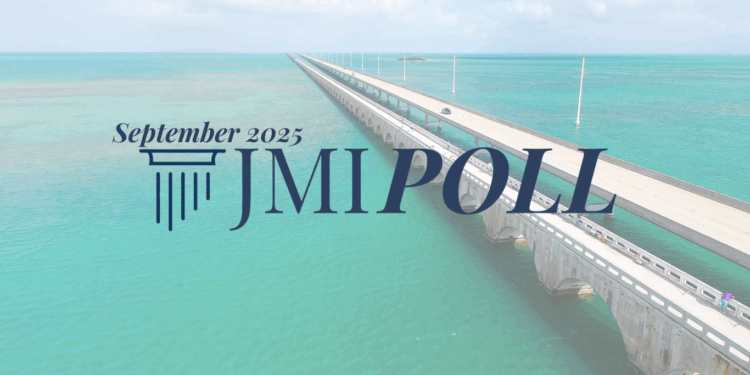The James Madison Institute Releases Latest JMI Poll of Florida Voters
Rising Cost-of-Living and Accessing Housing that is Affordable Continue to Top Voters’ Concerns
Majority of Voters Unsupportive of Removing All Vaccine Mandates
Today, The James Madison Institute unveiled the latest installment of the JMI Poll, a comprehensive survey of 1,200 registered Florida voters, offering a revealing look at voter priorities and preferences across key policy and political issues including taxes, education choice, economic pressures, vaccines, and the 2026 elections.
The results underscore Floridians’ priorities: easing cost-of-living burdens through tax relief and regulatory reform, expanding educational options, and maintaining Florida’s pro-freedom stance.
Economic Pressures and Property Tax Relief: Floridians Demand Lower Taxes
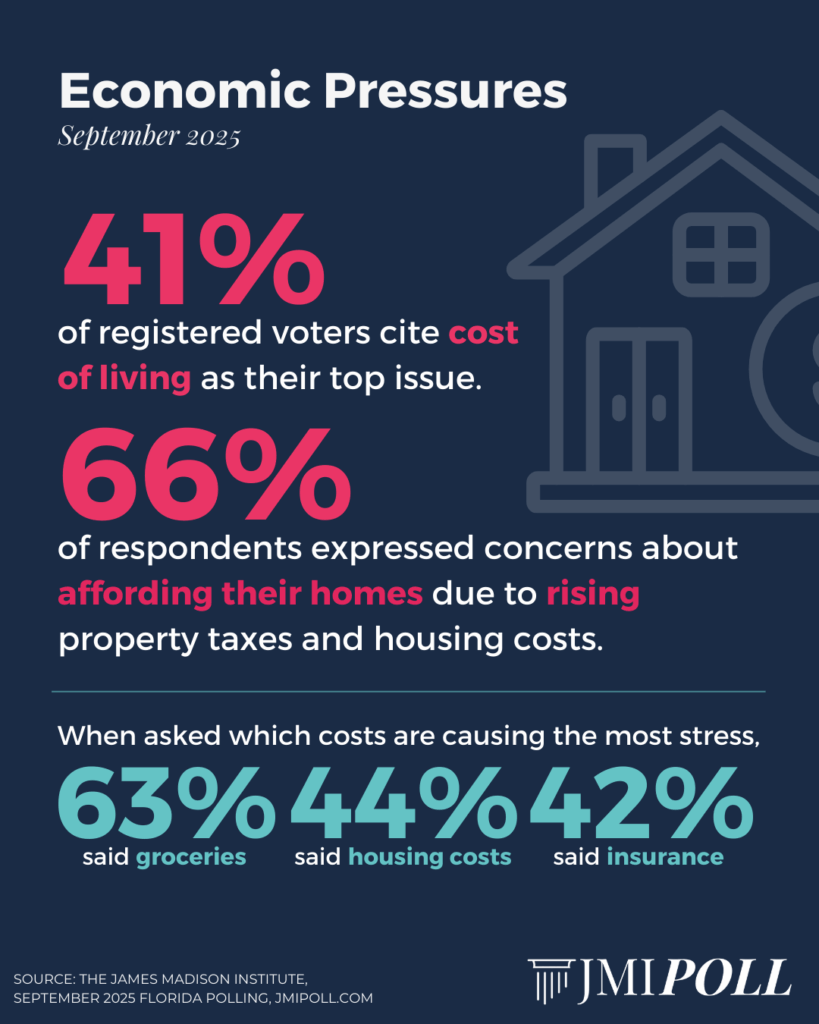
Cost-of-living concerns continue to dominate the minds of Florida voters, with 41% citing it as their top issue, and a majority are stressed by everyday expenses. A striking 66% express concern about affording their homes due to rising property taxes and housing costs.
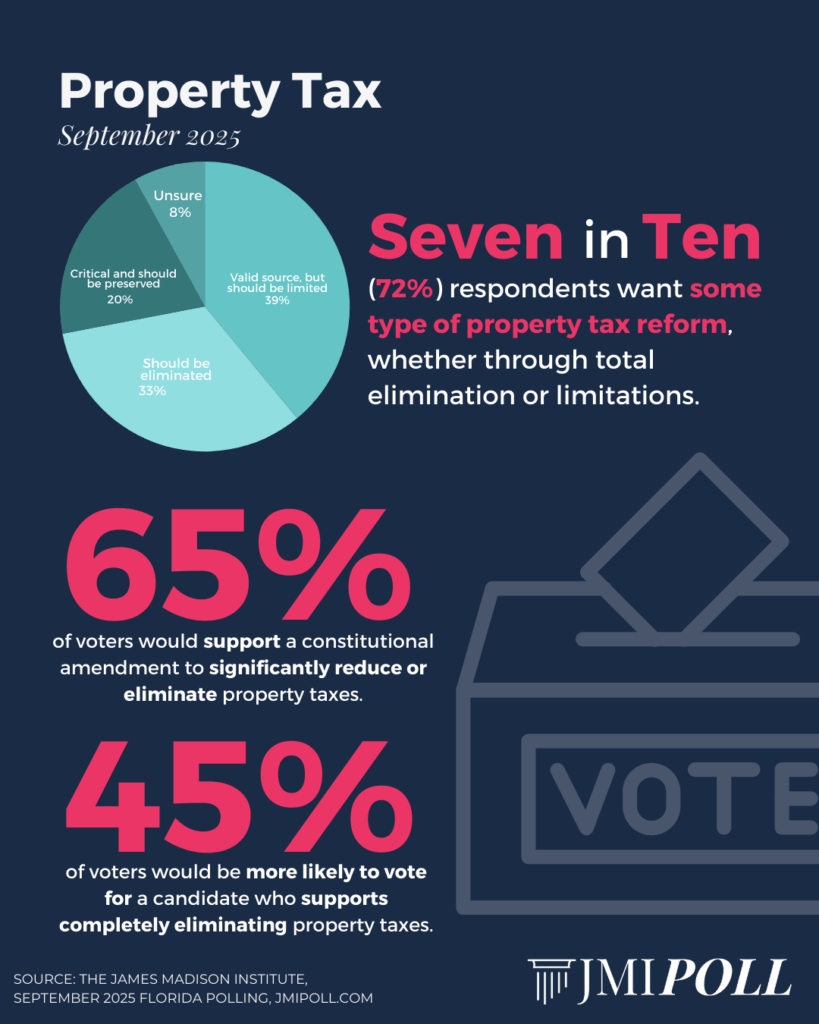
Looking ahead to the 2026 Legislative Session, Florida voters have called for relief from steadily climbing property tax rates. When asked about their views of property taxes, 33% want property taxes eliminated outright, while 39% say they should be limited but are a valid source for revenue.
A candidate advocating full elimination would garner support from 45% of voters, with only 18% less likely to back them. If a constitutional amendment to significantly reduce or eliminate property taxes appeared on the ballot, 65% would vote yes versus 15% opposed.
2026 Gubernatorial Outlook
Ahead of the 2026 Florida Gubernatorial Elections, the latest JMI Poll shows many voters remain undecided.
Nearly one in three (30%) registered voters describe themselves as “politically homeless,” feeling unrepresented by either the Democratic or Republican parties, which signals a ripe opportunity for candidates to engage disaffected moderates and independents. This sentiment aligns with broader concerns about political polarization, which is cited as the second-largest issue (18%), after cost-of-living pressures. It underscores the need for principled leadership that emphasizes fiscal responsibility over partisan divisiveness. With 24% of registered voters identifying as independents—54% of whom are strictly non-partisan—these voters could tip any close races in the state.
2026 Primary Election Hypotheticals
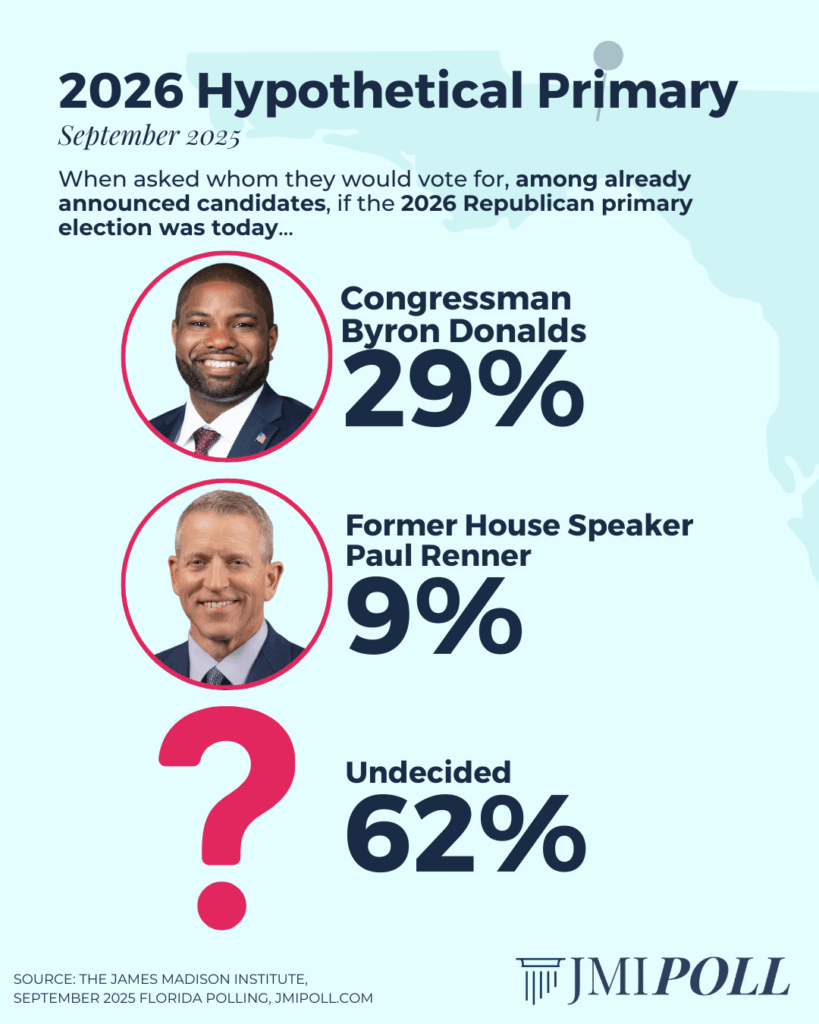
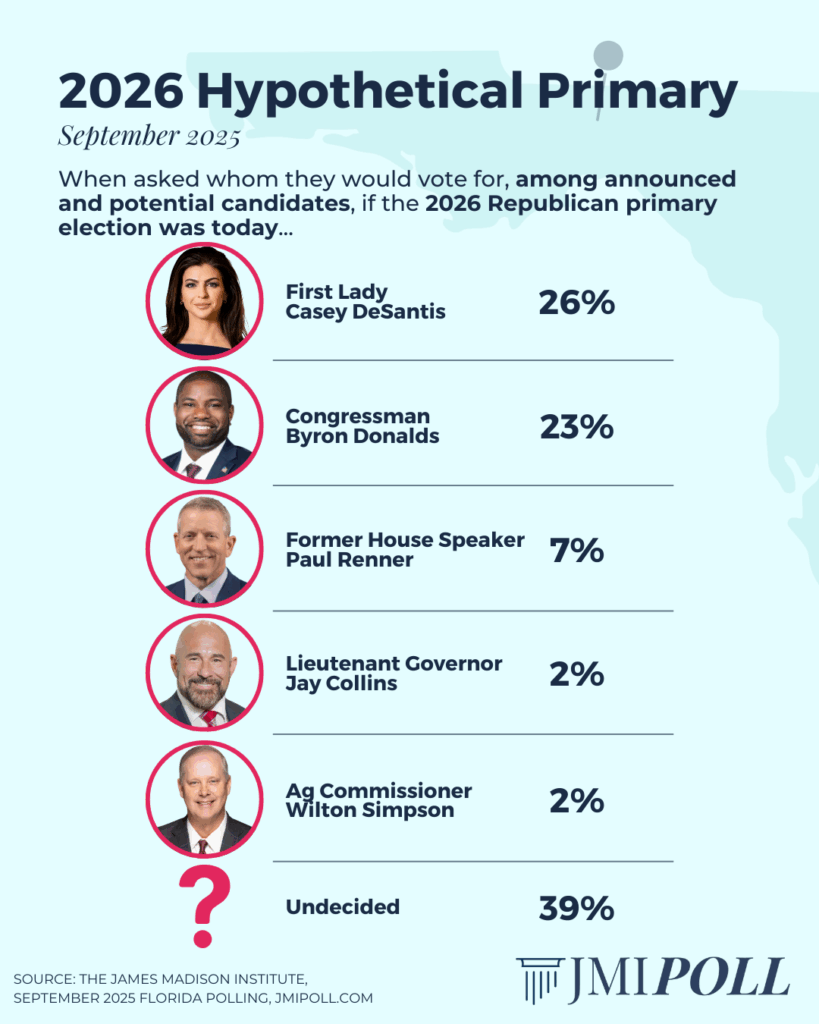
When asked if the election were held today among announced Republican primary candidates for Governor, U.S. Rep. Byron Donalds led announced candidates at 29% (vs. 9% for former House Speaker Paul Renner), with 62% undecided.
In an expanded field, First Lady Casey DeSantis tops at 26%, followed by Donalds at 23%, Renner at 7%, Florida Lieutenant Governor Jay Collins at 2%, Florida Agriculture Commissioner Wilton Simpson at 2%, and 39% remain undecided.
2026 General Election Hypotheticals
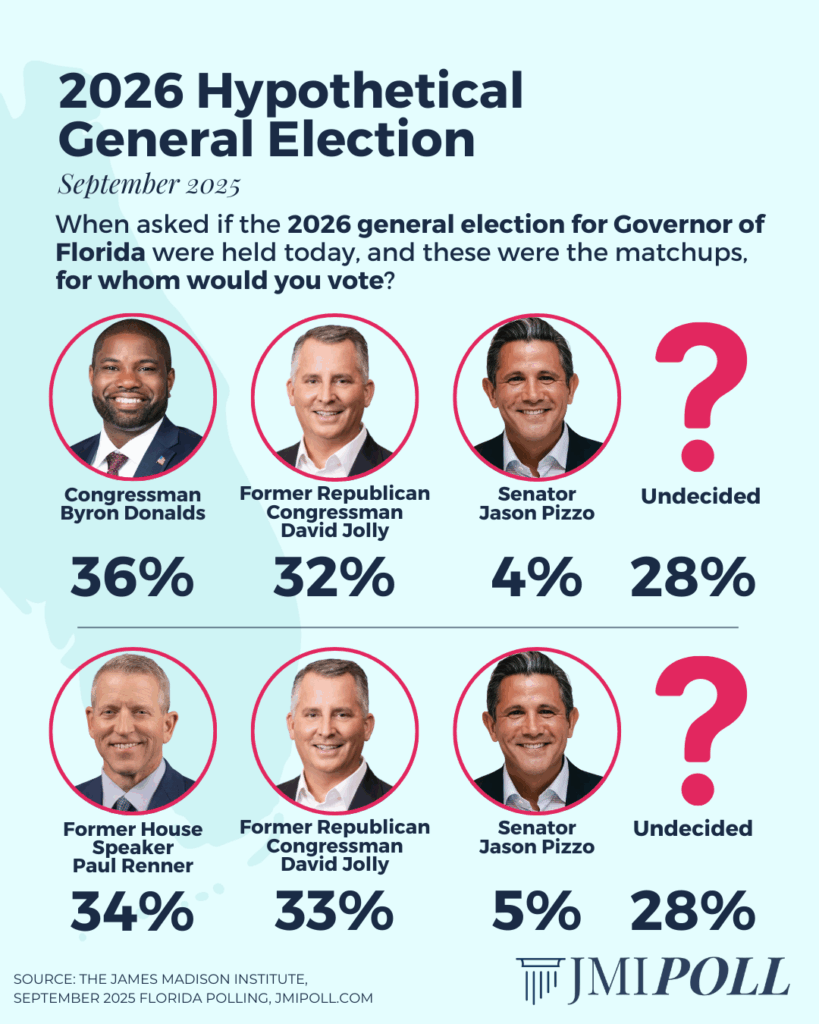
In a hypothetical Florida Gubernatorial General Election among announced candidates, Donalds (R) edges Democrat David Jolly 36%-32% and Renner (R) leads 34%-33%. Independent Jason Pizzo garners 4-5%.
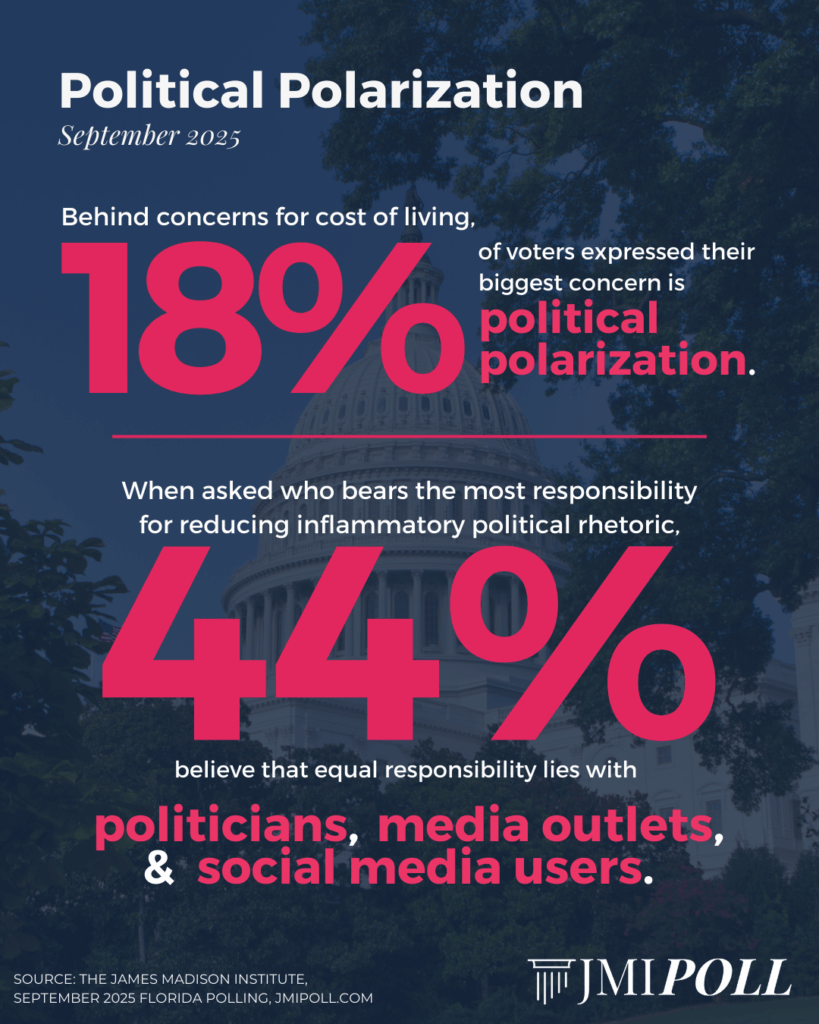
This poll was conducted September 16-18, following the shocking assassination of Charlie Kirk on September 10, an event that has deepened national political tensions. With 18% of voters citing “political polarization” as a top concern, the survey reveals that 44% believe politicians, media, and social media users share equal responsibility for reducing inflammatory rhetoric, while 25% specifically point to politicians as the primary duty-bearers.
This heightened focus on leadership accountability amid Kirk’s death underscores a call for unified action to bridge divides, potentially shaping voter priorities on contentious issues. More than half (53%) of registered voters want society to balance addressing challenges (e.g., inequality) with building on our strengths (e.g., innovation) as a nation.
Floridians view the U.S. as having the most personal and political freedoms compared to other countries (62%) including most Democrats (52%), suggesting a desire to protect economic liberty.
Florida Voters Favor Vaccine Mandates
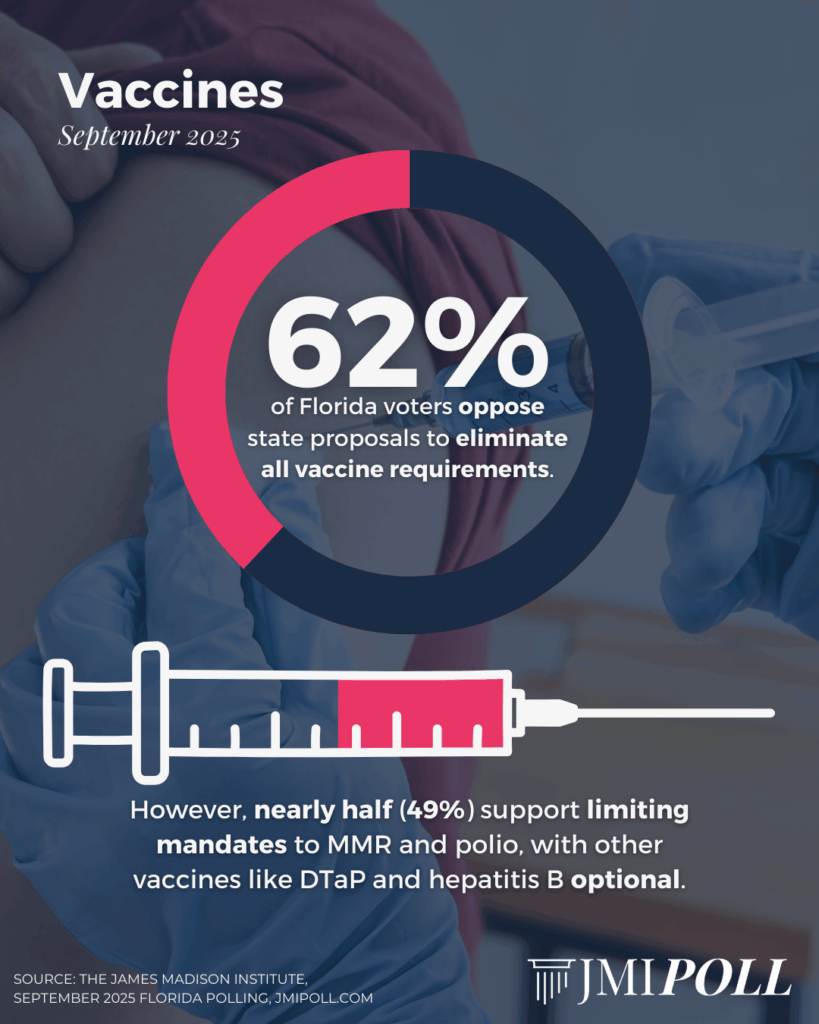
Florida voters favor maintaining robust vaccine policies for public schools, with 62% opposing a state proposal to eliminate all vaccine requirements —such as for measles, polio, and chickenpox. Just 29% support the change.
However, nearly half (49%) back a streamlined U.S. childhood vaccine schedule limiting mandates to MMR and polio, with other vaccines like DTaP and hepatitis B optional. Less than two in five voters (38%) prefer the current broader approach, signaling a cautious yet practical stance on public health amid ongoing debates on vaccine safety.
Overwhelming Backing for Choice and Deregulation
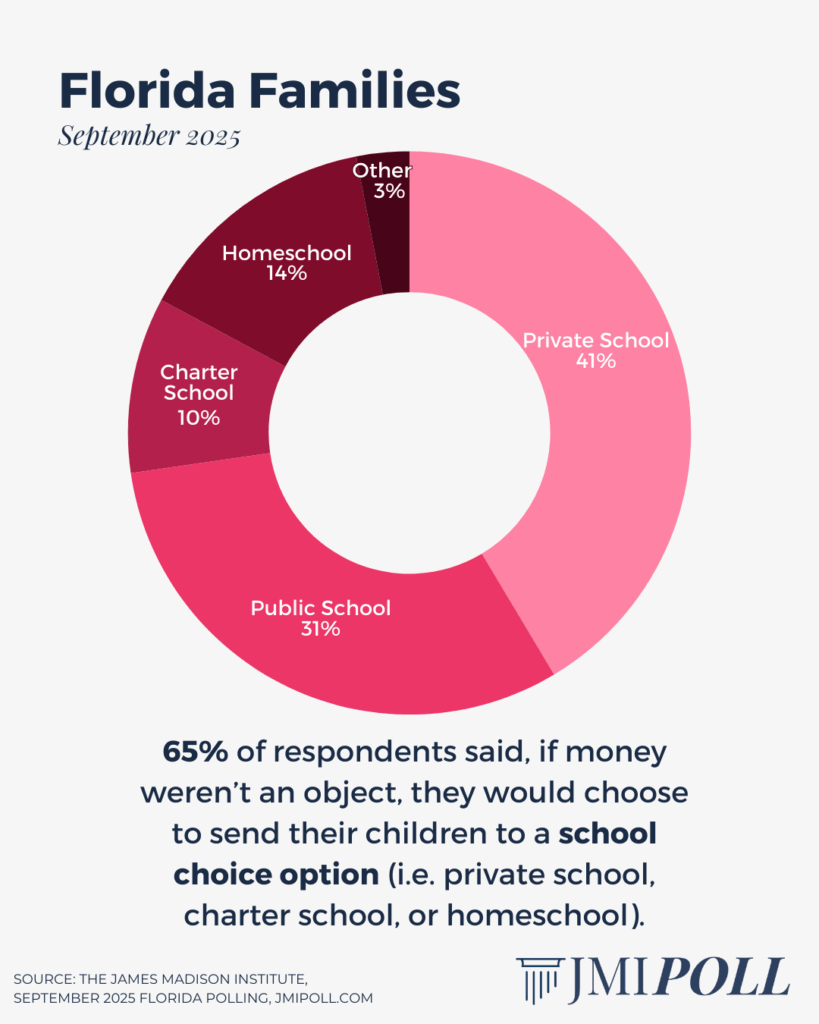
Floridians prioritize innovation and parental control in K-12 education, favoring private options and reduced barriers for alternative modes of education.
If cost were no object, 65% of voters would opt for some form of school choice (41% private schools, 14% homeschooling, and 10% charters).
Truth-in-Grading-Schools. During the 2025 legislative session, lawmakers considered a proposal to address rampant grade inflation in grading Florida schools. Of the Floridians surveyed, 74% believe schools deserve an “A” grade only if scoring 90% or higher on the metrics used to measure excellence.
Aiding ‘Plan B’ Families. Last year, 41,000 families applied for and were awarded K-12 scholarships that they ended up not using because of the undersupply of private school classroom space in their area. To aid these families (who had to resort to “Plan B”), 66% of the Floridians surveyed said that local zoning and land use restrictions should be lifted to facilitate the growth of small private schools.
Co-Locational School Buildings. Another proposed way to address the under-supply of private school classroom space is for public schools to lease unused classroom space to private providers for a fee during the school week (much in the way that public schools rent unused space to start-up churches on the weekends). Of the Floridians surveyed, 61% support renting unused classroom space to private educators.
Course Offerings for Part-Time Students. While many public school districts have expressed concern about future funding, some “homeschool-adjacent” students receiving a K-12 scholarship would like to take individual courses from a nearby school. Of the Floridians surveyed, 58% believe public schools should offer individual courses for a fee to part-time scholarship students.
These findings reinforce voters’ desire for expanded school choice, further empowering families.
Views on Tech Policy
As America’s digital economy expands, data centers have emerged as critical infrastructure, powering everything from video streaming and e-commerce to artificial intelligence (AI) applications. With demand for computational capacity surging nationwide, Florida has become an increasingly attractive destination for data center development. The polling suggests that Floridians have a generally positive attitude toward data centers, with 52% supporting new construction for AI/cloud services. The top concerns are higher electricity prices (36%) and infrastructure strain (25%).
AI has the power to transform the American workplace, automating routine tasks and allowing employees to spend more time on strategic, high-value work. The polling reveals a divide among Florida workers: while 40% use AI daily or regularly in their jobs, nearly one-third report never using it at all. Younger people (17%) are more than 3x more likely to use AI daily than those 55+ (5%), North Floridians were more than twice as likely to use AI daily (21%) than the next highest region in Florida (Southwest at 9%), and those with children in the household were significantly more likely (19%) to be daily AI users than those without kids (7%).
Find the official JMI Poll page here: jmipoll.com
You can read the full poll with party and regional crosstabs here.
You can read the full poll with demographic crosstabs here.
You can read the full poll of registered voters crosstabs here.

